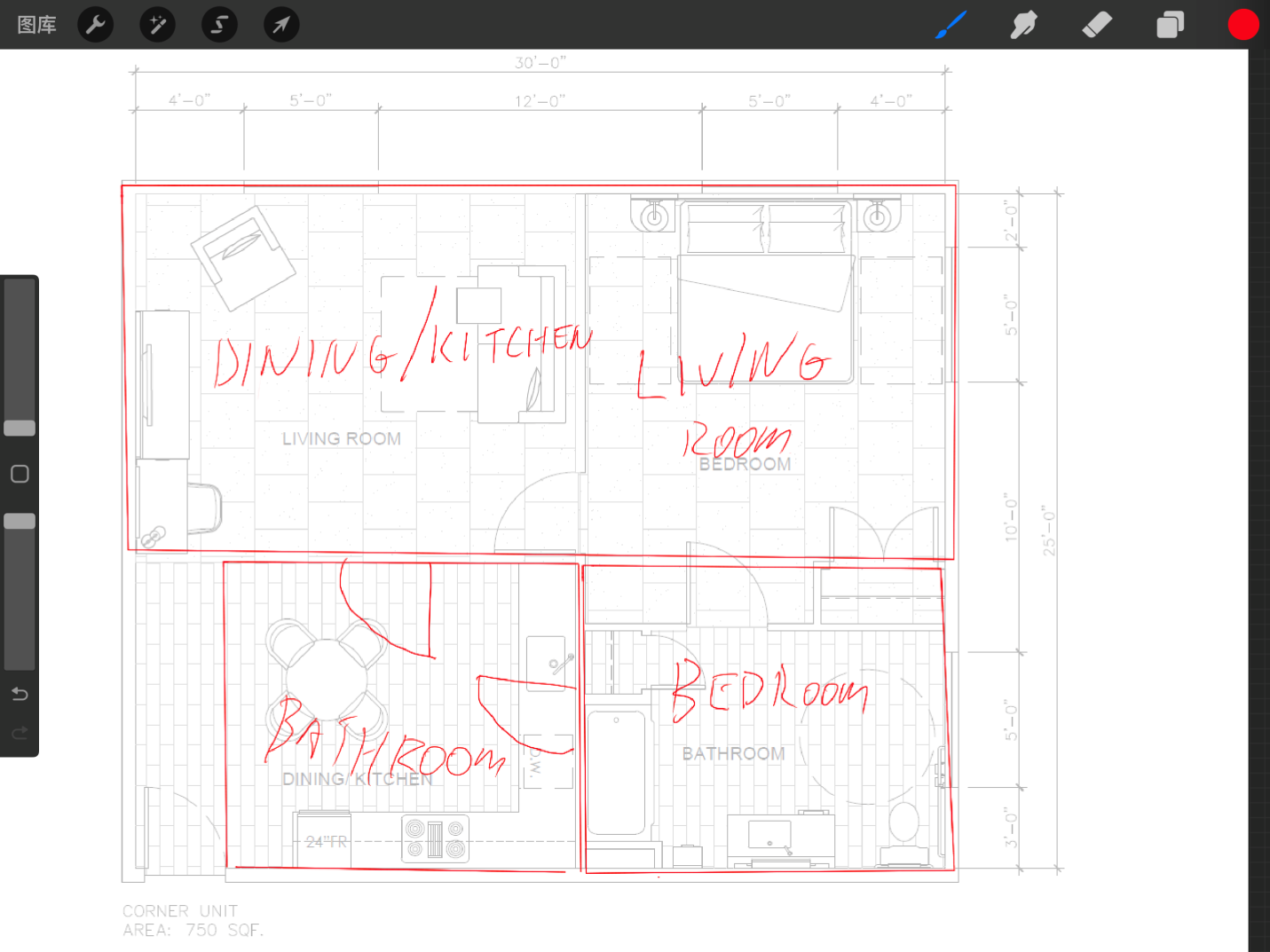Addressing elders’ unique demands and psychological factors in architectural design as society ages becomes more vital. Seniors’ physical and mental capacities vary from those of younger individuals, and their living environments must be planned to promote their health and quality of life. Psychological factors such as readability, adaptability, durability, and affordability play a crucial part in designing senior-friendly living situations. By understanding and using these psychological concepts, architects and designers may develop spaces that meet the physical demands of elders and enhance their autonomy, safety, and well-being. This essay will analyze the relevance of these psychological concerns in senior living architectural plan, notably concentrating on the design of kitchens, dining spaces, bedrooms, and bathrooms.
Psychological Considerations in Senior Living Architectural Designs
As in Figure 1, the proposed plan considers physical and psychological demands when designing living places for elders. In ensuring psychological stability among the residents, the plan ensures that the living area has safe circulation and navigation components. In the plan, the sense of safety with a guarantee of ease of movement is purposed to improve self-confidence and independence critical in reducing psychological distress. The customization choices provide a feeling of territory and privacy, and furnishings and fixtures accommodate the demands of elders with physical or mental limitations (Cicirelli et al., 2021). The seniors are provided with sturdy, easy-to-clean, and supportive furnishings, while customization possibilities bring comfort and familiarity. By addressing both physical and psychological needs of the elderly, the plan offers a secure and adaptable living space that satisfies the needs independence and self-confidence.

Psychological Considerations in Kitchen/Dining Area Design
The designs consider adaptability and durability when creating a kitchen/dining space. The kitchen has easily accessible storage places, adjustable counter heights, and movable furniture. High-quality materials are utilized for appliances and fixtures in a kitchenette with a microwave, sink and cabinets. The psychological consequences of adaptability include reduced anxiety and a sense of independence and self-sufficiency (Spence, 2020). Such convenience is critical in generating a feeling of self-sufficiency and a sense of situational control.
Psychological Considerations in Bedroom Design
When creating a bedroom for elders, the architectural design keenly considers adaptability, durability, and cost. In design thinking, legibility refers to the clarity and usability of the bedroom, while flexibility refers to the bedroom’s adaptability to the changing demands of elders (Spence, 2020). In the proposed plan, different colors and the bedroom carpet are placed to ensure durability and safety. A well-designed bedroom is purposed to improve the quality of sleep for seniors fostering a sense of safety and stability and boosting their overall mental health (Cicirelli et al., 2021). The plan handrails, wide corridors, natural light and biophilic design with single-size beds fitted with safety bars.
Psychological Considerations in Bathroom Design
Further, using design aspects and concepts such as non-slip waterproof flooring for the bathroom ensures that the elders may have a substantial sense of safety. In architectural design, by allowing seniors to undertake personal hygiene duties without help, a well-designed bathroom may increase seniors’ feelings of independence and autonomy (Cicirelli et al., 2021). The design features an ADA bathroom with grab bars, a seat and bar shower, and simple faucets to turn on and off. The non-slip surfaces floors, coupled with a spacious shower stall, are enough for wheelchair mobility guaranteeing independence.
Conclusion
Designing living environments that suit seniors’ physical, emotional, and psychological requirements requires understanding senior living architecture. The plan presents living environments encouraging elders’ independence, self-sufficiency, and well-being. In architectural designs, integrating psychological perspectives in the plans enhances seniors’ quality of life. The proposed designs guarantee that residents can age with dignity, independence, and comfort. It is essential to continue considering the psychological requirements of elders in architectural design and to guarantee that all seniors have access to living settings that support their health and happiness.
References
Cicirelli, G., Marani, R., Petitti, A., Milella, A., & D’Orazio, T. (2021). Ambient assisted living: A review of technologies, methodologies and future perspectives for healthy aging of population. Sensors, 21(10), 3549. Web.
Spence, C. (2020). Senses of place: Architectural design for the multisensory mind. Cognitive Research: Principles and Implications, 5(46) 4–17. Web.